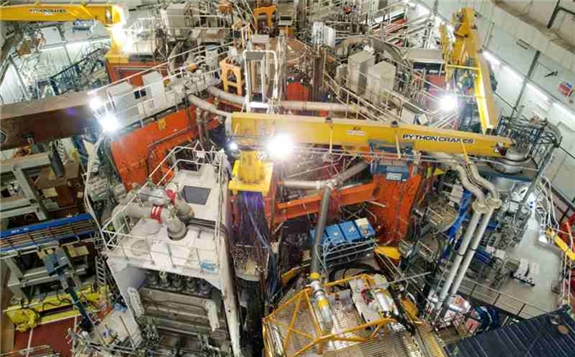A new partnership has been signed between The University of Manchester and the UK Atomic Energy Authority (UKAEA) to help accelerate the UK’s progress toward net zero through the development of fusion energy.

The new agreement between the parties will see a significant addition to the University’s Dalton Nuclear Institute’s research activity. Two new research groups will be established, with six new academic appointments, focused on researching sustainable energy produced by fusion.
Martin O’Brien, head of University Liaison at the UK Atomic Energy Authority, said: “Many universities already work with us on a wide range of research topics. We are excited that The University of Manchester will now expand greatly its work with us in two key areas where progress is needed to deliver a fusion power station.”
These two key areas of research are tritium and digital engineering. Tritium – one of the two fuels commercial fusion devices will use – is a growing area of study, boosted by UKAEA’s new H3AT tritium research facility at Culham. Digital engineering is a highly promising computer-based approach that allows engineers to arrive at final versions of systems quicker and cheaper than traditional methods
Professor Francis Livens, director of the Dalton Nuclear Institute at The University of Manchester, said: “This new collaboration in fusion complements and builds on our long term strength in nuclear research, will allow us to build important new research and training activities in Tritium Science & Technology and Digitalisation, and extend our exciting collaboration with UKAEA”.
Fusion is an attractive alternative energy source that, when commercialised, will generate electricity without greenhouse gases. Fusion has now reached the point where significant investment is being made internationally to develop a commercially viable solution. Work so far has been closely integrated with the European Fusion programme and in the development of ITER (International Thermonuclear Experimental Reactor) in France.
Through UKAEA, the UK Government has already committed £220 million ($304 million) over four years to develop the STEP (Spherical Tokamak for Energy Production) concept with the aim of building a power station based on the STEP design by 2040. This is an area where new research is required to address some of the significant challenges in realising STEP and will continue to be a focus of external investment.
Fusion energy is an area of national and international priority and has been explicitly identified in the UK’s Government’s Ten Point Plan for a Green Industrial Revolution, and in the December 2020 Energy White Paper.
The UK Atomic Energy Authority (UKAEA) carries out fusion energy research on behalf of the UK Government at Culham Science Centre near Oxford. UKAEA oversees the UK’s fusion programme, headed by the MAST Upgrade (Mega Amp Spherical Tokamak) experiment. It also hosts the world’s largest fusion research facility, JET (Joint European Torus), which it operates for European scientists under a contract with the European Commission.